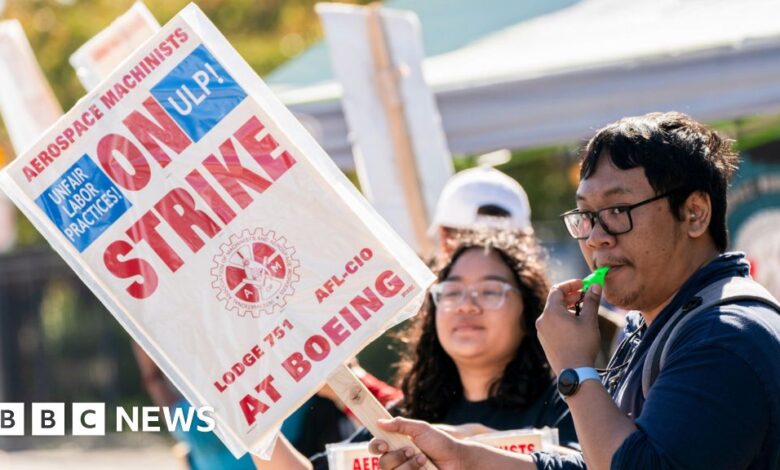Boeing withdrew its proposal to raise wages by 30% for striking workers

Boeing said it withdrew its offer to raise wages for striking workers after negotiations with union representatives reached a deadlock.
The airline giant accused the alliance of not taking its proposals seriously.
The International Association of Machinists and Aerospace Workers (IAM) said Boeing was “extremely determined to stand by its non-negotiable offer” which it said was rejected by its members.
Last month, Boeing announced what it called its “best and final” offer to workers, proposing a 30% raise over four years – less than the 40% the union had demanded.
Boeing Commercial Airplanes President Stephanie Pope said in a letter to employees: “The union has made non-negotiable demands that go far beyond what would be acceptable if we wanted to remain competitive as way of being a business”.
“With that in mind, further negotiations make no sense at this time and our offer has been withdrawn.”
But union representatives said Boeing was not willing to negotiate the terms of the plane maker’s latest offer.
IAM said in a statement: “Negotiators tried to address multiple priorities that could lead to an offer that we could put to a vote, but the company was not willing to go in our direction.” ”.
More than 30,000 Boeing workers in the US northwest went on strike last month after overwhelmingly rejecting a tentative deal that included a 25% pay increase.
In response to a strike that halted production of some of its aircraft, the company suspended work for tens of thousands of employees.
Boeing said U.S.-based executives, managers and employees will be required to take a week off every four weeks as long as the strike lasts.
The company said the impact of the strike would depend on its duration, but analysts said a prolonged shutdown could cost the company and its suppliers billions of dollars. .
The most recent strike at Boeing in 2008 lasted about eight weeks.
The deadlock adds to the challenges Boeing’s new CEO Kelly Ortbergwho was appointed in August with a mission to turn the business around.
Before the strike, the company was facing historic losses, while production had slowed as the company responded to concerns about the quality of its production.




